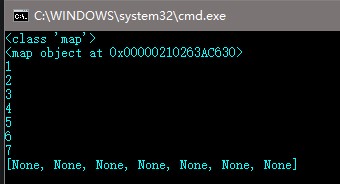● 空函数生成
1 # -*- coding: UTF-8 -*- 2 def myFoo(): 3 poss #加上poss 就可以生成空函数了
● 函数print
1 print(type(print))

print的本质就是一个变量
如果我们直接给 print 赋值,函数就无法调用了
1 # -*- coding: UTF-8 -*- 2 num = 10 3 other = num #other int 类型 num 此时 other 是一个整型 4 print(other) 5 other = print #other 输出类型的 函数 print 是一个函数 6 other(66666) #此时 other 拥有了 print的功能
感觉好牛X哦
● 函数可以当作变量来使用
1 # -*- coding: UTF-8 -*- 2 def foo(x,f): 3 f(x) 4 foo(10,print)

1 # -*- coding: UTF-8 -*- 2 temp = map(print,[1,2,3,4,5,6,7]) 3 print(type(temp)) 4 print(temp) #迭代对象 5 print(list(temp)) #可以转换成list

1 # -*- coding: UTF-8 -*- 2 def foo(x): 3 return x**2 #计算每一个数求立方 4 5 print(list(map(foo,list(range(10)))))

map 里面的每一个元素都调用一次。
● 模块导入
import functoolsx
#导入模块内所有的函数
form functools import reduce
#从模块内导入 一个函数
● 返回函数 延迟调用
1 # -*- coding: UTF-8 -*- 2 def sum(*args): 3 n_sum = 0 4 for num in args: 5 n_sum += num 6 return n_sum 7 8 num = sum(1,2,3,4,5) 9 print(num)

● 函数绑定
1 # -*- coding: UTF-8 -*- 2 functools.partial(int,base=2) 3 int2 = functools.partial(int, base=2) 4 int2("1010101001001010101")